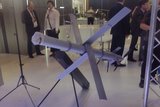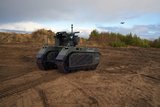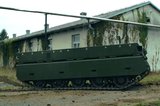Spain PM defends sending weapons to Saudis after U-turn
Spain's Prime Minister on 16 September defended his government's controversial decision to go ahead with the delivery of 400 laser-guided bombs to Saudi Arabia, saying it was needed to preserve good ties with the Gulf state.
His Socialist government announced earlier in September month that it would block the delivery of the weapons amid concerns that they could harm civilians in Yemen where Saudi Arabia is engaged in a bloody conflict.
But on 13 September Spain’s Foreign Minister Josep Borrell announced the government had decided to deliver the weapons after all, angering humanitarian groups.
Cancellation of the deal would jeopardise a much larger order for five Corvette warships worth EUR 1.8 billion ($2.09 billion), to be built by Spain's Navantia shipyard in the southern region of Andalusia, with thousands of jobs at stake.
Workers in the region, a stronghold of the ruling Socialist Party, had staged demonstrations pressing for the deal to go ahead.
Asked about the policy reversal during an interview with private television La Sexta, Prime Minister Pedro Sanchez said his government risked ‘creating the image that it was revising its entire relationship’ with Saudi Arabia if it did not deliver the weapons.
Sanchez added: ‘The situation was very complicated. The dilemma the government faced was breaking its commercial, economic and political ties with Saudi Arabia, with the impact this could have in some areas of the country, such as the Bay of Cadiz, or carry out a contract signed by the previous government.’
Saudi Arabia, a longtime ally, had already paid EUR 9.2 million ($10.7 million) for the bombs under a 2015 contract signed by a previous, conservative administration in Spain.
Apart from the warship deal, Madrid has obtained juicy engineering contracts to build a high-speed railway linking Mecca and Medina, and a metro in Riyadh.
Spain is the fourth largest provider of military equipment and weapons to the Gulf state, according to Amnesty International.
Nearly 10,000 people have been killed in Yemen since Saudi Arabia, the United Arab Emirates and other allies intervened in 2015 after Huthi rebels ousted the government from the capital Sanaa and seized swathes of the country.
More from Land Warfare
-
![Estonia builds Asia-Pacific links as it looks to scale defence industry capabilities]()
Estonia builds Asia-Pacific links as it looks to scale defence industry capabilities
Collaboration between Estonian defence companies and well-aligned firms in Asia-Pacific will form a key part of Tallinn’s ambitions to significantly grow its defence industrial base.
-
![World Defense Show 2026: DOK-ING working on MV-8 variants and reveals specs ahead of Eurosatory]()
World Defense Show 2026: DOK-ING working on MV-8 variants and reveals specs ahead of Eurosatory
The Croatian company began the development of the MV-8 modular uncrewed platform in the early 2020s. Specifications for the vehicle were revealed to Shephard at World Defense Show 2026.
-
![World Defense Show 2026: Turkish and European industries will cooperate, says Aselsan boss]()
World Defense Show 2026: Turkish and European industries will cooperate, says Aselsan boss
Aselsan was formed 50 years ago in response to difficulties Turkey was facing in sourcing major systems internationally. While some challenges still remain, company president Ahmet Akyol believes a rapprochement is possible.
-
![World Defense Show 2026: MARSS displays new Nation Shield air defence C2 system]()
World Defense Show 2026: MARSS displays new Nation Shield air defence C2 system
Nation Shield is the latest iteration of the MARSS C2 system and is designed to provide C2 further forward along with more capable air defence.
-
![World Defense Show 2026: Middle East remains focused on US equipment and local industry involvement]()
World Defense Show 2026: Middle East remains focused on US equipment and local industry involvement
Vehicle procurement in the Middle East continues to target big-ticket main battle tanks, with lighter platform purchases also potentially on the horizon including tactical, infantry fighting and armoured personnel carrier vehicles.





















